

Are the mind and body separate? They may be in perception « Psychology In Action. In the history of thought, the idea that the mind and body are separate has been hotly debated.
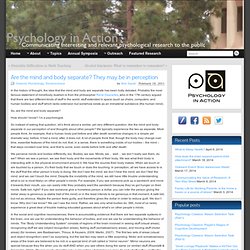
Probably the most famous statement of mind/body dualism is from the philosopher René Descartes, who in the 17th century argued that there are two different kinds of stuff in the world: stuff extended in space (such as chairs, computers, and human bodies) and stuff which lacks extension but somehow exists as an immaterial substance (the human mind). So, are the mind and body separate? How should I know? I’m a psychologist. Debate on Mirror Neuron. 'SMF', on 07 Apr 2011 - 01:29 AM, said:
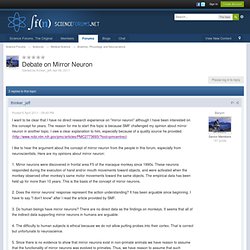
Mirror neuron - NeuronBankWiki. From NeuronBankWiki. VS Ramachandran: The neurons that shaped civilization. MIRROR NEURONS AND THE BRAIN IN A VAT By V.S. Ramachandran. "I am a brain, my dear Watson, and the rest of me is a mere appendage.
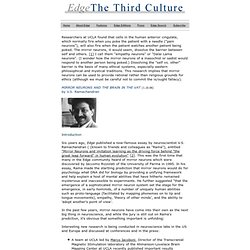
" — Sherlock Holmes An idea that would be "dangerous if true" is what Francis Crick referred to as "the astonishing hypothesis"; the notion that our conscious experience and sense of self is based entirely on the activity of a hundred billion bits of jelly — the neurons that constitute the brain. We take this for granted in these enlightened times but even so it never ceases to amaze me.
Some scholars have criticized Crick's tongue-in-cheek phrase (and title of his book) on the grounds that the hypothesis he refers to is "neither astonishing nor a hypothesis". Let's put this in historical perspective. Mirror Neurons Fire Better at Close Range. A newly discovered type of brain cell may help us prep for social interactions.
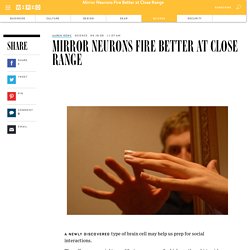
The cells are a special type of "mirror neurons," which are thought to aid understanding of the actions and intentions of others. Mirror neurons fire both when you do something, like grab a bottle of wine, and when you watch another person do the same thing. Instead of carrying out a step-by-step reasoning process to figure out why a friend is grabbing a bottle of wine, we instantly understand what’s going on inside his head because it’s going on in our heads too. Now, researchers have discovered some mirror neurons don’t just care about what another individual is doing, they also care about how far away they’re doing it, and, more importantly, whether there’s potential for interaction.
Cells That Read Minds. First direct recording made of mirror neurons in human brain. Mirror neurons, many say, are what make us human.

They are the cells in the brain that fire not only when we perform a particular action but also when we watch someone else perform that same action. Neuroscientists believe this "mirroring" is the mechanism by which we can "read" the minds of others and empathize with them. Mirror Neurons. Mirror Neurons PBS air date: January 25, 2005 ROBERT KRULWICH: Hello again.

Gaze into a mirror, and what do you see? Well, I see my face, of course. But in my face I see moods, I see shifts of feeling. We humans are really good at reading faces and bodies. Ask yourself, "Why do people get so involved, so deeply, deeply involved, with such anguish, such pain, such nail biting tension over football? " COMMENTATOR: The Cleveland Browns are gambling on defense. ROBERT KRULWICH: Why are we such suckers for sports? Well, as it happens, scientists have an explanation for this strange ability to connect. DANIEL GLASER: It had never been found on a cellular level before. Mirror Neurons
Mirror neuron. Theory of mind. Definition[edit] Theory of mind is a theory insofar as the mind is not directly observable.[1] The presumption that others have a mind is termed a theory of mind because each human can only intuit the existence of his/her own mind through introspection, and no one has direct access to the mind of another.
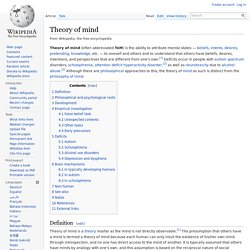
It is typically assumed that others have minds by analogy with one's own, and this assumption is based on the reciprocal nature of social interaction, as observed in joint attention,[4] the functional use of language,[5] and the understanding of others' emotions and actions.[6] Having a theory of mind allows one to attribute thoughts, desires, and intentions to others, to predict or explain their actions, and to posit their intentions. Theory of mind appears to be an innate potential ability in humans; one requiring social and other experience over many years for its full development. Different people may develop more, or less, effective theories of mind. Development[edit] Autism[edit] Talking Brains: Two new ways the mirror system claim is losing steam. Next week Giacomo Rizzolatti will give the Keynote Address at the 23rd annual meeting of the Association for Psychological Science.
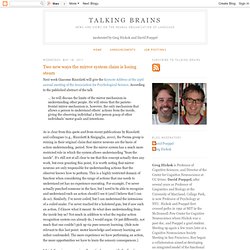
According to the published abstract of the talk ... he will discuss the limits of the mirror mechanism in understanding other people. He will stress that the parieto-frontal mirror mechanism is, however, the only mechanism that allows a person to understand others’ actions from the inside, giving the observing individual a first-person grasp of other individuals’ motor goals and intentions. As is clear from this quote and from recent publications by Rizzolatti and colleagues (e.g., Rizzolatti & Sinigaglia, 2010), the Parma group is reining in their original claim that mirror neurons are the basis of action understanding, period.